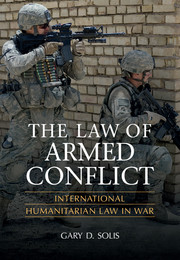Book contents
- Frontmatter
- Contents
- Table of Cases
- Table of Treaties
- Foreword
- Preface
- Acknowledgments
- LAW OF ARMED CONFLICT: INTERNATIONAL HUMANITARIAN LAW IN WAR
- LAW OF ARMED CONFLICT AND INTERNATIONAL HUMANITARIAN LAW: A FRAMEWORK
- LAW OF ARMED CONFLICT AND INTERNATIONAL HUMANITARIAN LAW: BATTLEFIELD ISSUES
- 9 Obedience to Orders, the First Defense
- 10 Command Responsibility and Respondeat Superior
- 11 Ruses and Perfidy
- 12 Torture
- 13 Rules of Engagement
- 14 Targeting
- 15 Attacks on Cultural Property
- 16 The 1980 Certain Conventional Weapons Convention
- 17 Gas, Biological, and Chemical Weapons Treaties
- References
- Index
- References
12 - Torture
from LAW OF ARMED CONFLICT AND INTERNATIONAL HUMANITARIAN LAW: BATTLEFIELD ISSUES
- Frontmatter
- Contents
- Table of Cases
- Table of Treaties
- Foreword
- Preface
- Acknowledgments
- LAW OF ARMED CONFLICT: INTERNATIONAL HUMANITARIAN LAW IN WAR
- LAW OF ARMED CONFLICT AND INTERNATIONAL HUMANITARIAN LAW: A FRAMEWORK
- LAW OF ARMED CONFLICT AND INTERNATIONAL HUMANITARIAN LAW: BATTLEFIELD ISSUES
- 9 Obedience to Orders, the First Defense
- 10 Command Responsibility and Respondeat Superior
- 11 Ruses and Perfidy
- 12 Torture
- 13 Rules of Engagement
- 14 Targeting
- 15 Attacks on Cultural Property
- 16 The 1980 Certain Conventional Weapons Convention
- 17 Gas, Biological, and Chemical Weapons Treaties
- References
- Index
- References
Summary
Introduction
The law of armed conflict (LOAC) and international humanitarian law (IHL) are clear in their positions regarding torture: It may never be engaged in, under any circumstances. U.S. military law, like the military law of all states, forbids torture. No exceptions are provided for. Torture nevertheless happens because, as Harvard law professor Alan Dershowitz points out, “[t]he tragic reality is that torture sometimes works, much though many people wish it did not.” Of course, asserting that torture sometimes works tells us nothing of its legal dimensions.
After the 9/11 attacks, a change in attitude overtook a portion of the American public, including members of the armed forces: In some circles torture came to be acceptable. A 2005 Associated Press–Ipsos survey of 1,000 Americans found that, where terrorism is involved, 61 percent of Americans do not rule out torture. Eleven percent responded that torture could be used often, 27 percent said sometimes, and 23 percent said rarely. Thirty-six percent said it could never be justified. It is dismaying that, even the editor of Armed Forces Journal, a respected Washington publication, expressed support for torture in terrorism cases. Richard A. Posner, the influential U.S. Court of Appeals judge for the Seventh Circuit, declared that in extreme circumstances the president can authorize torture to avoid catastrophic attack. In 2004, Senator Trent Lott, when asked about his vocal defense of interrogation techniques used at Iraq's Abu Ghraib prison, replied, “…Interrogation is not a Sunday-school class.
- Type
- Chapter
- Information
- The Law of Armed ConflictInternational Humanitarian Law in War, pp. 436 - 489Publisher: Cambridge University PressPrint publication year: 2010



